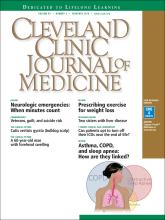Index by author
Kabach, Amjad
- You have accessCan patients opt to turn off implantable cardioverter-defibrillators near the end of life?M. Motaz Baibars, MD, M. Chadi Alraies, MD, FACP, Amjad Kabach, MD and Marc Pritzker, MD, FACCCleveland Clinic Journal of Medicine February 2016, 83 (2) 97-98; DOI: https://doi.org/10.3949/ccjm.83a.15007
Yes, it is reasonable to consider deactivation near the end of life if the patient or family wishes.
Khatri, Sumita B.
- You have accessThe intersection of obstructive lung disease and sleep apneaSumita B. Khatri, MD, MS and Octavian C. Ioachimescu, MD, PhDCleveland Clinic Journal of Medicine February 2016, 83 (2) 127-140; DOI: https://doi.org/10.3949/ccjm.83a.14104
Many patients who have chronic obstructive pulmonary disease or asthma also have obstructive sleep apnea, and vice versa.
Kodish, Eric
- You have accessThe ethics of ICDs: History and future directionsMartin L. Smith, STD and Eric Kodish, MDCleveland Clinic Journal of Medicine February 2016, 83 (2) 99-100; DOI: https://doi.org/10.3949/ccjm.83a.15122
There is no ethical requirement that treatment, once started, must continue against the patient’s wishes.
Kopacz, Marek S.
- You have accessVeterans, guilt, and suicide risk: An opportunity to collaborate with chaplains?Marek S. Kopacz, Md, PhD, Kathy A. Rasmussen, PhD, Robert F. Searle, DMin, BCC, Barbara M. Wozniak, PhD and Caitlin E. Titus, MSCleveland Clinic Journal of Medicine February 2016, 83 (2) 101-105; DOI: https://doi.org/10.3949/ccjm.83a.15070
Chaplains and clinicians bring complementary skills and services to the problem of suicide risk in veterans.
Kottapally, Mohan
- You have accessCommon neurologic emergencies for nonneurologists: When minutes countMohan Kottapally, MD and S. Andrew Josephson, MDCleveland Clinic Journal of Medicine February 2016, 83 (2) 116-126; DOI: https://doi.org/10.3949/ccjm.83a.14121
Recognizing and treating acute stroke, status epilepticus, subarachnoid hemorrhage, and others.
Mandell, Brian F.
- You have accessHope may not be the best component of an exercise regimenBrian F. Mandell, MD, PhDCleveland Clinic Journal of Medicine February 2016, 83 (2) 89; DOI: https://doi.org/10.3949/ccjm.83b.02016
Exercising to lose weight more often results in frustration than a trip to the store to buy smaller-sized clothes.
Mcgeeney, Robert J.
- You have accessMany shades of guiltAmy Elise Greene, DMin and Robert J. McGeeney, DMinCleveland Clinic Journal of Medicine February 2016, 83 (2) 106-108; DOI: https://doi.org/10.3949/ccjm.83a.15136
Guilt in patients with suicidal tendencies is a profoundly spiritual issue.
Miller, Brandon
- You have accessA 60-year-old man with forehead swellingBrandon Miller, MDCleveland Clinic Journal of Medicine February 2016, 83 (2) 95-96; DOI: https://doi.org/10.3949/ccjm.83a.15011
CT and MRI revealed infection in close proximity to the brain. The patient recovered with antibiotics and surgery.
Ngarmukos, Chadpraorn
- You have accessBulldog scalpChutintorn Sriphrapradang, MD and Chadpraorn Ngarmukos, MDCleveland Clinic Journal of Medicine February 2016, 83 (2) 90-91; DOI: https://doi.org/10.3949/ccjm.83a.15019
A 54-year-old man presented with a 2-year history of unusual skin folds on the scalp—cutis verticis gyrata.
Pritzker, Marc
- You have accessCan patients opt to turn off implantable cardioverter-defibrillators near the end of life?M. Motaz Baibars, MD, M. Chadi Alraies, MD, FACP, Amjad Kabach, MD and Marc Pritzker, MD, FACCCleveland Clinic Journal of Medicine February 2016, 83 (2) 97-98; DOI: https://doi.org/10.3949/ccjm.83a.15007
Yes, it is reasonable to consider deactivation near the end of life if the patient or family wishes.




